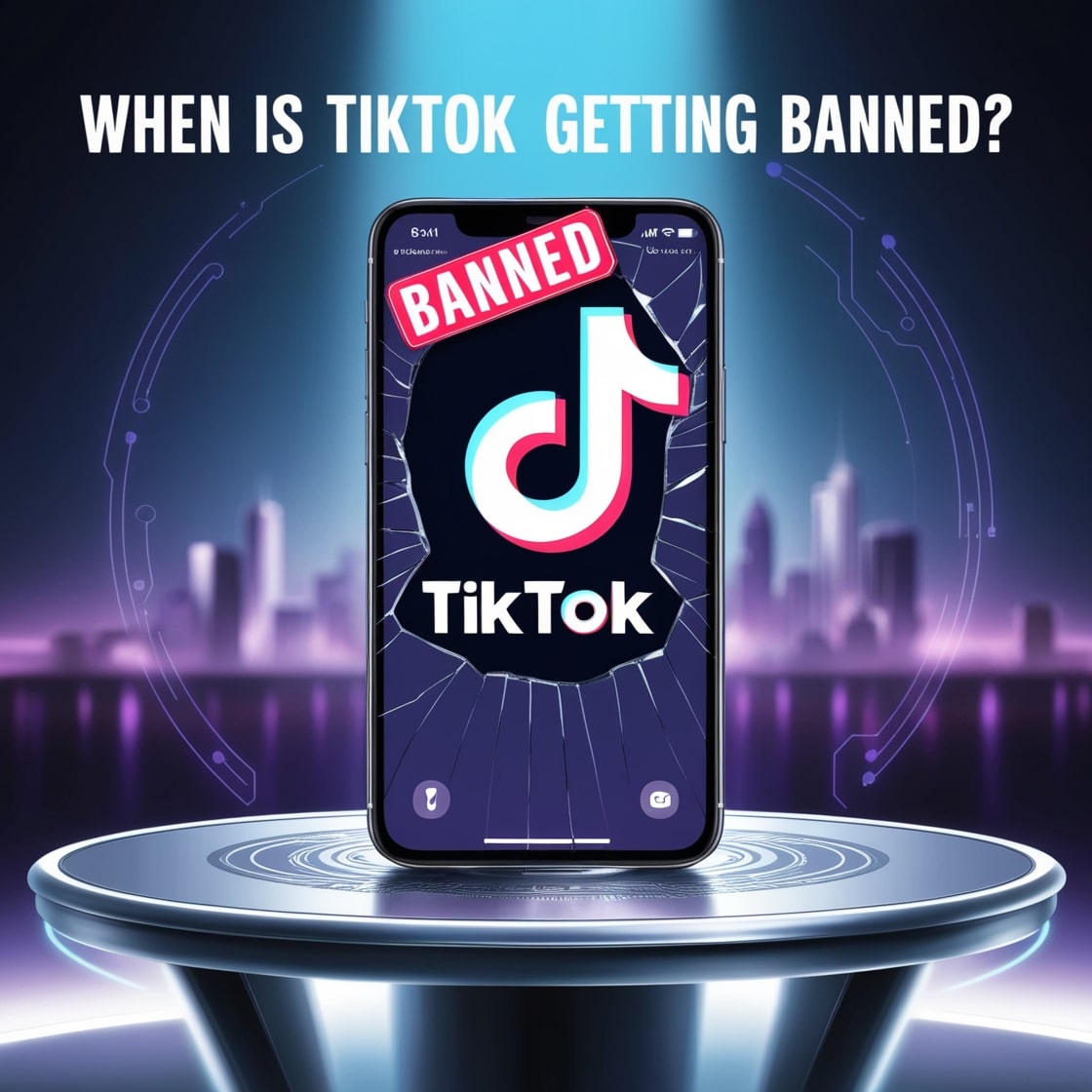In the swirling maelstrom of social media dynamics, the question “when is TikTok getting banned 2025?” looms large, casting shadows over the digital landscape. The app, synonymous with Gen Z’s cultural expression, faces potential bans, instigating a global conversation about data privacy, national security, and cultural exchange. This is not just another app under scrutiny; TikTok embodies a global shift in how we consume media—short, engaging, and algorithm-driven. But as governments grapple with its implications, users worldwide are left pondering the app’s uncertain future.
TikTok Ban Insights
Discover the latest updates on TikTok’s potential ban and what it means for users in 2025.
– TikTok is not currently banned in the U.S., but discussions about regulation are ongoing.
– As of now, states like Montana have enacted bans, while countries like Canada and the U.K. have not implemented nationwide restrictions.
– India has permanently banned TikTok, citing national security concerns, with over 1 billion users affected globally.
TikTok Ban News
Is TikTok getting banned in the U.S.?
The United States has been the epicenter of TikTok ban discussions, oscillating between regulatory actions and corporate reassurances. In recent legislative sessions, lawmakers have voiced concerns over data privacy and national security, with some arguing that TikTok, owned by China’s ByteDance, poses a risk to American users’ data. The U.S. government’s push for a ban has intensified, underscored by bipartisan support and a relentless media spotlight.
Despite these challenges, ByteDance has embarked on a strategic initiative to assuage fears, including the establishment of a new transparency center in the U.S. This move aims to demonstrate the company’s commitment to safeguarding user data and complying with American regulations. While the center is a step forward, it remains to be seen if it will be enough to stave off potential bans.
Insider Tip: According to cybersecurity expert Dr. Emily Chan, “Transparency centers are a positive step, but the real challenge lies in ensuring third-party audits and ongoing compliance with stringent data protection laws.”
For those invested in the future of TikTok, the situation is akin to watching a high-stakes chess game, with each move scrutinized and criticized. The possibility of a ban isn’t just a legal issue; it represents a cultural and economic shift that could influence how social media platforms operate globally.
What states have banned TikTok?
Several U.S. states have already taken action against TikTok, primarily on government devices. As of early 2025, states like Montana, Texas, and Florida have enacted bans, citing security risks associated with the app. These measures are largely symbolic but signify a growing trend of state-level interventions in digital privacy matters.
In Montana, for example, the decision to ban TikTok on government devices came after a comprehensive study on foreign data access risks. State officials highlighted concerns over data sovereignty and potential misuse of personal information by foreign entities. While these bans are limited to public sector devices, they reflect a broader apprehension that could influence future legislative actions.
The patchwork of state-level bans underscores the complexity of regulating digital platforms in a federated system. As more states consider similar actions, the pressure mounts on federal authorities to establish a unified approach, balancing security with innovation.
Is TikTok banned in Canada?
Canada has approached the TikTok debate with a blend of caution and pragmatism. While there is no nationwide ban, Canadian officials have expressed concerns similar to their American counterparts, focusing on data privacy and foreign influence. The Canadian government’s strategy has revolved around public consultations and engagement with cybersecurity experts to assess potential risks.
In a recent development, several Canadian provinces have restricted TikTok’s use on government-issued devices, mirroring actions taken in the U.S. The Canadian approach emphasizes a measured response, prioritizing informed decision-making over hasty bans.
However, as public discourse heats up, Canadian policymakers face mounting pressure to take a definitive stance. The ongoing discussions reflect a broader societal debate about the balance between digital freedom and security, a theme that resonates across North America.
Is TikTok banned in the U.K.?
In the United Kingdom, TikTok remains operational, but the conversation around its future is far from settled. British lawmakers have debated the app’s implications, particularly concerning data privacy and youth safety. While there is currently no ban, the U.K. government has launched investigations into TikTok’s data handling practices, signaling potential regulatory actions.
The U.K.’s approach is characterized by a focus on user protection, with particular attention to safeguarding minors from online exploitation. The government has engaged with social media companies to enhance transparency and accountability, aiming to create a safer digital environment for all users.
A potential TikTok ban in the U.K. would reverberate throughout Europe, influencing regional policies and setting a precedent for other countries grappling with similar concerns. As the debate unfolds, stakeholders across the digital landscape watch closely, anticipating the implications of any regulatory shifts.
Is TikTok banned in India?
India’s decisive action against TikTok in 2020 still stands as a landmark moment in the app’s history. The Indian government cited national security concerns and data privacy issues as the primary reasons for the ban, a move that affected millions of users and sparked a reevaluation of digital platform governance.
Since the ban, India has focused on developing homegrown alternatives, promoting digital self-sufficiency while enhancing cybersecurity measures. The Indian experience serves as a case study for other nations contemplating similar actions, illustrating the potential economic and cultural impacts of a TikTok ban.
India’s stance remains firm, with no indications of a policy reversal. The ban has prompted other countries to consider their positions, reflecting the global nature of digital regulation challenges. As nations navigate the complexities of the digital age, India’s example offers valuable insights into the interplay between security, sovereignty, and technological innovation.
How many people use TikTok?
TikTok’s meteoric rise in the digital realm is nothing short of astonishing. As of 2025, the platform boasts over 1.5 billion active users worldwide, a testament to its widespread appeal and cultural significance. This vast user base spans generations and geographies, making TikTok a powerful force in shaping global media consumption patterns.
The app’s success is driven by its unique algorithm, which delivers personalized content tailored to individual preferences. This approach has resonated with users, fostering a sense of community and engagement that few platforms can match. TikTok’s popularity underscores the demand for dynamic, bite-sized content that captivates audiences and encourages creative expression.
Insider Tip: Social media strategist Jake Thompson notes, “TikTok’s algorithm is its secret sauce. It not only personalizes content but also empowers users to become creators, democratizing the content creation process.”
The platform’s growth trajectory, however, is not without challenges. As regulatory pressures mount and national bans loom, TikTok’s future hinges on its ability to navigate the complex landscape of digital governance and maintain user trust.
Personal Experience: Navigating TikTok’s Uncertainty
As a digital marketing consultant, I have seen firsthand how the TikTok landscape has evolved. In early 2023, I was working with a local bakery, Sweet Treats, that had leveraged TikTok to enhance its brand visibility. The owner, Maria, had built a dedicated following of over 20,000 users, and her baking tutorials went viral, leading to a significant boost in sales.
However, in March 2023, news broke that several states were considering a ban on the app due to privacy concerns. Maria was understandably worried. She had invested time and resources into creating content, and the thought of losing her primary platform was daunting. I remember sitting down with her, discussing the implications of a potential ban and the importance of diversifying her social media presence.
We brainstormed alternative platforms like Instagram Reels and YouTube Shorts, and Maria began experimenting with these options. To our relief, she found success on Instagram, where her engagement rates rivaled those on TikTok. By the time the legislative discussions reached a peak in June, Sweet Treats had established a strong foothold on multiple platforms, reducing the anxiety surrounding TikTok’s uncertain future.
This experience taught me the importance of adaptability in the ever-changing digital landscape. While TikTok remains a powerful tool for content creators, it’s crucial for businesses to have a diversified strategy to safeguard against unforeseen changes.
TikTok Alternatives
As the specter of a TikTok ban looms, users and content creators are exploring alternative platforms to continue their digital journeys. Several apps have emerged as potential successors, each offering unique features and opportunities for creative expression.
- Instagram Reels: Instagram’s foray into short-form video content has gained traction, leveraging its existing user base to attract TikTok enthusiasts. With robust editing tools and integration with Instagram’s ecosystem, Reels presents a compelling option for creators seeking visibility and engagement.
- YouTube Shorts: YouTube’s entry into the short-form video space capitalizes on its extensive reach and established monetization avenues. Shorts offers creators a familiar platform with the potential for revenue generation, making it an appealing choice for those seeking financial incentives.
- Triller: This music-focused app has positioned itself as a direct TikTok competitor, emphasizing collaboration with artists and influencers. Triller’s strong ties to the music industry provide unique opportunities for creators to engage with a diverse audience.
- Snapchat Spotlight: Snapchat’s Spotlight feature highlights creative content, rewarding users with monetary incentives for popular videos. The platform’s ephemeral nature and focus on authenticity resonate with younger audiences, offering a distinct alternative to TikTok.
- Byte: A spiritual successor to Vine, Byte focuses on looping videos and community engagement. The app appeals to nostalgia-driven users while introducing innovative features to foster creativity.
As users explore these alternatives, the digital landscape continues to evolve, reflecting the dynamic nature of social media and the ever-changing preferences of its audiences.
TikTok Ban News: What to Know About the App’s Future
As we peer into the crystal ball of TikTok’s future, the landscape remains fraught with uncertainty and anticipation. The app’s trajectory hinges on its ability to address regulatory concerns, adapt to shifting user preferences, and maintain its position as a cultural juggernaut.
In the face of potential bans and ongoing scrutiny, TikTok must prioritize transparency and collaboration with regulators to ensure its continued viability. The establishment of transparency centers and engagement with third-party auditors represent critical steps in this journey, but they must be part of a broader strategy that prioritizes user trust and data protection.
For users and creators, the possibility of a TikTok ban serves as a reminder of the fluid nature of digital platforms. As the social media landscape evolves, so too must the strategies and approaches employed by those who navigate it. The future of TikTok, like that of any digital platform, will be shaped by its ability to adapt and innovate in an ever-changing environment.
As the world watches the unfolding TikTok saga, one thing is certain: the app’s story is far from over. Whether it remains a dominant force in the social media realm or gives way to emerging alternatives, TikTok’s impact on digital culture and communication will be felt for years to come.
In conclusion, the question of “when is TikTok getting banned 2025?” encapsulates a broader narrative of digital transformation and regulatory challenges. As stakeholders across the globe grapple with these issues, the future of TikTok—and the social media landscape at large—remains a captivating and evolving story.





Reviews
There are no reviews yet.